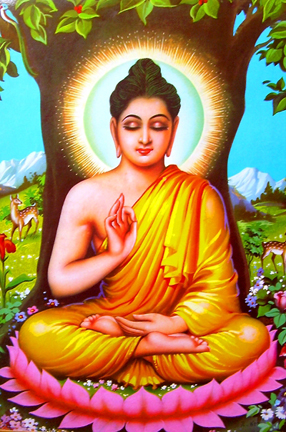 Dhamma is not for scholarly exercises Dhamma is not for scholarly exercises
…Is Buddhism scientific?
by K.K.S. Perera
Dhamma doesn’t tell the patient the meaning of
sickness; so much as it tells him what he needs to do. Dhamma is the present
moment’s path of action in birth, life, and death. We can’t change the past, but
could have definite control over the future if one acts with skill and precision
in the present moment.
Buddha’s path is so non-sectarian, so universal, blind faith rejected,
result-oriented, ‘come and see ’, he stressed, ‘do not believe until you
practise and experience teaching.’
Misinterpretations in Dhamma and accuracy of teachings
But, is Buddhism, as we are taught today, the authentic discourse of the Buddha?
May I ask the learned and the erudite monks and lay scholars out of analytical
inquisitiveness and not with any intention to challenge or humiliate them or
subject their wisdom to ridicule, the following.
 How could such a deep and complex viewpoint, as that was preached, have been
perfectly and precisely documented after a substantial lapse of time, when we
could not recall a story related to us by someone, even a few minutes later.
Furthermore, one must consider that the literacy and education of the average
person in the present era is by far superior to that of, 25 centuries ago, in
the Buddha’s era and yet a simple mental task is not possible today. Being a
Buddhist, I am provoked by the simple reason to question, word for word the
authority of the teachings as taught at present. I am sure, other faiths too
have a similar situation because, as far as I am aware, not only was there scope
for human error to sneak in when the sayings were recorded, while interpretation
of the original substance too certainly crept in. How could such a deep and complex viewpoint, as that was preached, have been
perfectly and precisely documented after a substantial lapse of time, when we
could not recall a story related to us by someone, even a few minutes later.
Furthermore, one must consider that the literacy and education of the average
person in the present era is by far superior to that of, 25 centuries ago, in
the Buddha’s era and yet a simple mental task is not possible today. Being a
Buddhist, I am provoked by the simple reason to question, word for word the
authority of the teachings as taught at present. I am sure, other faiths too
have a similar situation because, as far as I am aware, not only was there scope
for human error to sneak in when the sayings were recorded, while interpretation
of the original substance too certainly crept in.
Among those who blindly accept anything devoid of query, I am certain to stir up
a hornet’s nest, but I am entitled to a convincing explanation as to how we can
be confident of the correctness of the script. Buddha encouraged us to not
blindly admit without query but to explore for ourselves, which is a very
important feature of Dhamma, compared to other faiths where blind belief and
recognition play a major role.
The term sarddha is wrongly interpreted as follows, ‘veneration and loyal
confidence and self-reliance developed by an understanding of the profound
Dhamma preached by the Buddha...’ according to the Kalama Sutra this is most
undesirable. ‘He who labels himself is not free’: Understanding of the
unequalled Dhamma
As against blindly following the religion into which one is registered due to an
accident of birth, Buddha encourages query. To those who quest for
understanding, conscience forbids such conviction - where all theism is placed
in doubt - The essential question that the Buddha asks of humans is, can we lead
good and truthful lives and comprehend our bliss in this very life? If I call
myself a Buddhist, I have to accept the entire paraphernalia of ritual
religiosity in ‘Buddhism’, which is empty of substance.
A Protestant once had commented, if all relics of the Holy Cross spread across
the Earth were brought together, one can build a fleet of ships. Most of the
rituals, prayers and charms of the Buddhist, Catholic, and Hindu religions are
marvellously related. Devotees of all faiths go on pilgrimage to Kataragama and
St. Anthony’s Kochikade though there are fundamental differences in the
doctrines.
Dhamma and Science: Albert Einstein, Rhys Davis and Arthur C Clarke
Prof. Rhys Davis has said, he examined every one of the great religions and in
none of them did he find anything to outshine, in beauty and depth, the
teachings of the Buddha, and that he is pleased to shape his life according to
the principles. Albert Einstein, the father of modern science, declared that he
is not a religious person, but if he were one he would be a Buddhist.
The Dhamma agrees with the scientific propositions rather than the theologians.
All things are transitory, continually arising, becoming, varying and vanishing;
there is nothing whatsoever that is essentially or independently present;
Neither of these cause any threat to the Dhamma, which says, we are in a state
of uninterrupted change [flux] - situation and sensory requirements assist one
to find ways to delight; Atheists who cast insults on ‘believers’ of other view
points, need to find answers to inexplicable areas in their own ideas,
pronouncements, and hypothesis rather than working on volumes or delusions. The
Darwinists have not answered the vital question of speciation; a rational
explanation free from uncertainties is expected of them. Neither Darwin nor the
present interpreters, the neo-Darwinians, have offered a solid answer that can
go deeply and carefully into the working of ‘Evolution of Species’. The Dhamma
emphasises that the truth can be comprehended only by application of rationale
and mind-centered empiricism (Experiment/Experience) easily accessible to
everyone without the help of interpreters, researchers or students of academic
studies.
Today, we live in a world which has become a living contradiction, a world of
huge wealth, but also in the depths of poverty, where 1.4 billion people,
one-fourth of the world’s population live in constant want. Though we have
achieved unbelievable advances in medicinal and healthcare facilities; yet 10
million people die from diseases which could easily be cared for. A world where
daily trade in lethal weapons exceeds millions of dollars, yet where over 7
million children die of hunger and 800 million humans are severely
undernourished. And perhaps, most alarming of all, a world bent on unlimited
growth, on a planet whose finite resources are rapidly diminishing. Thus, with
our brave march into the future, our world still suffers looking for a way out,
for a cure has become an imminent need if humanity is to carry on unharmed, to
the next century.
Personal transformation
The Dhamma approach to health and healing is its emphasis on spiritual practice.
It asserts that spiritual practice makes it possible for an individual not only
to see opportunity for practice in the face of adversity, including sickness and
injury, but use opportunity for personal transformation and transcendence.
It inspires the practitioner to view the world as being interconnected and
living beings, human or animal as brothers and sisters, and to turn his or her
thoughts towards the welfare of all living things. Dhamma doesn’t tell the
patient the meaning of sickness; so much as it tells him what he needs to do.
Dhamma is the present moment’s path of action in birth, life, and death. We
can’t change the past, but could have definite control over the future if one
acts with skill and precision in the present moment.
Einstein said, a field is not in fact an actual model for space-time events, but
the “continuum of probability distributions of potential measurements as a
function of time.” In other words, the field is a continuum of all possible
energy and information states which will afterwards manifest themselves as
space-time events. Matter is a space-time event. We in physical bodies are
space-time events. We confuse ourselves with these space-time events, when in
fact we are the ones who cause these space-time events.
The proponents and champions of the scientific method referring to theists cry
that, an element of belief can be eliminated only by adhering strictly to the
scientific method ; but on the other hand, scientists too live by the confidence
and faith in the power of reason and belief in scientific concepts some of which
yet remain neither proved nor disproved.
Some scientists do make science their religion. Scientific formulae, theories
and concepts are also subjected to amendment, replacement, modification or even
discarded, as new theories, ideas and hypothesis are established.
It was Arthur C Clarke, the British born world-renowned Sri Lankan scientist who
said in year 2000: “I don’t believe in God or an afterlife”, and he identified
himself as an atheist and described himself as a “crypto-Buddhist”, asserting
that Buddhism is not a religion. Talking of religion he said, “One of the great
tragedies of human kind is that morality is hijacked by religion”.
Many scientific concepts are explained vaguely; for instance ‘species’ in
biology cannot be defined precisely owing to the many blurred areas.
Nonetheless, the concepts can be reasonably, practically applicable. Darwin
guessed that one species had branched off and evolved into an altogether new
one; but the dynamic process or the continuous flux makes it impossible to
demarcate where one species ended and a new one emerged.
Is Buddhism scientific? Views of a true scholar
Prof Arjuna de Zoysa in an academic paper says,
“It is not possible to view these knowledge systems from the stand point of
modern science quite simply because of the restrictive nature of the broad
paradigms embedded within its framework. I have seen innumerable debates in the
media on whether Buddhism is scientific and some authors draw on the findings of
modern science to legitimise Buddhist beliefs. This can lead only to trivial
results; at times various trivial conclusions may be reached such as that.
Bhavana is useful as a form of stress relaxation. Yoga as a physical exercise.
Ayurveda is valuable for its pharmacopoeia and Astrology is a necessary
psychological trick to cope with the uncertainties of life.
These conclusions are trivial and not necessary. Buddhism is not scientific,
neither is science Buddhistic; and it will never be so.” –
May all beings be happy!
|

